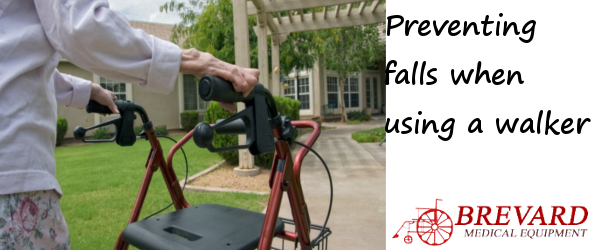Every year, 743,000 Older Americans have to be hospitalized because of non-fatal falls. It can be very costly to experience a fall—the Center for Disease Control estimates that in 2013 alone, the direct medical cost associated with falls amounted to $34 billion.
However, by using your walker properly, you can reduce your likelihood of a fall. Below are some tips on how to best prevent such a traumatic occurrence:
Do you have the right walker?
Walkers that have wheels on the bottom are not ideal for those who are worried about stability. Conversely, those who are worried about putting weight on their knees or feet should avoid walkers without wheels. The reason why is because wheeled walkers allow you to put your body weight against the device itself. Brevard Medical carries both types in our online catalog—you need to choose the one that’s right for you.
Is the grip comfortable?
If you’re not hanging on properly, then you risk a fall—but many people don’t hang on properly because it’s uncomfortable! Often, those with arthritis will have issues gripping the handle. You can buy covers for the handles that make them larger, so they’re friendlier to hands with arthritis. Or, you can get foam covers that make gripping them in general a little more comfortable.
Is it the right size?
The height of a walker should be even with your wrists when they’re at a resting position. Also, when you grip the walker, both your shoulders and your back should easily relax. A walker that’s too high or too low can pose tripping hazards.
Brevard Medical Equipment strives to make sure your life is as comfortable—and safe— as possible. We offer a variety of services that can ensure you a better quality of life, whether or not you use a walker.




Recent Comments